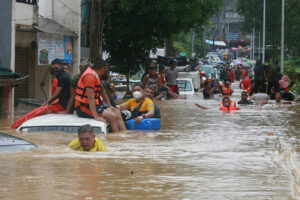
Hosting ‘loss and damage’ fund could focus attention on PHL climate finance
THE PHILIPPINES has an opportunity to attract more attention to its climate financing needs after it was chosen to host the board of the Loss and Damage Fund (LDF), the Department of Finance (DoF) said.
“Hosting the LDF Board will unlock more opportunities for the Philippines to accelerate its access to climate finance and investments, which are critical for future-proofing our economy and ensuring sustainable and inclusive growth,” Finance Secretary Ralph G. Recto said in a statement.
The Philippines was selected to host the LDF Board at a meeting in Incheon, South Korea on Tuesday.
President Ferdinand R. Marcos, Jr. made the announcement via X (formerly Twitter) late Tuesday.
“Hosting the LDF Board reinforces our dedication to inclusivity and our leadership role in ensuring that the voices of those most affected by climate change shape the future of international climate policy,” he said.
Other countries that were considered to host were Antigua and Barbuda, Armenia, the Bahamas, Barbados, Eswatini, Togo, and Kenya.
The fund seeks to support developing countries impacted by natural disasters caused by climate change. It will be operationalized by the World Bank for four years.
The Philippines is one of countries deemed most vulnerable to climate-related calamities, and struggles with limited resources for post-disaster rehabilitation and mitigation.
As the host of the board, the Philippines will have the chance to collaborate with other countries in tackling climate-related issues and disaster risk management, DoF said.
“By hosting the LDF Board, the Philippines will play a leading role in helping attract significant support from developed countries and development partners to provide concrete financial contributions in averting, minimizing, and addressing loss and damage,” the DoF added.
On March 1, Mr. Marcos established a technical working group to work on the country’s bid to host the LDF.
The bid offer was put forward by the DoF, the Department of Environment and Natural Resources, the Department of Foreign Affairs, the Department of Budget and Management, and the Climate Change Commission.
The Philippines secured a seat on the LDF Board during the 28th United Nations Climate Change Conference in Dubai in December.
Separately, Greenpeace campaigners have declared their support for legislation imposing a fossil fuel tax which will also hold companies accountable for their organizations’ climate impact.
Greenpeace Philippines added that hosting the Loss and Damage Fund Board adds urgency to the need to demonstrate that the government is among the leading practitioners of sound climate policy.
“The ball is now in the government’s court to reflect the country’s ambitions as the host of the board through its policies. This includes the certification of House Bill 9069 or the Clima Bill as urgent,” Greenpeace Campaigner Jefferson Chua said via Viber.
The bill, filed by at least six legislators last year, is considered by the international community as the first of its kind. It proposes to establish a system of reparations for those deemed responsible for the climate crisis, including corporations.
The Clima bill was introduced in the House of Representatives a year after the 2022 United Nations climate change conference (COP27), which ended with the announcement of the loss and damage fund.
The bill coincided with the release of a Commonwealth Climate and Law Initiative legal opinion that found that board directors have a duty to consider risks posed by climate change when determining shareholders’ best interests under Philippine corporation law.
Mr. Chua said the government should also push for a windfall fossil fuel profit tax in Congress and lobby for a carbon damages tax in international climate negotiations.
“Being chosen to host the Loss and Damage Fund Board is a good development, but what is even more important is that President Marcos help ensure that the fund has money.”
The Loss and Damage Fund Board is responsible for developing strategies to deliver financing to countries vulnerable to climate change.
Greenpeace said contributions to the fund “remain far below expectations amid escalating climate impacts and ballooning costs.”
“Our hosting of the L&D Fund Board underscores the huge responsibility of President Marcos and his administration in ensuring that Filipino communities get compensated for climate damages,” Mr. Chua said.
Rich countries that account for most of the world’s greenhouse gas emissions have pledged $700 million to the fund, falling short of the $100-580 billion estimate of annual losses and damage in developing countries.
In a 2019 report, the Philippines’ Commission on Human Rights said fossil fuel companies can be held liable for climate change and its effects. In its National Inquiry on Climate Change in 2022, the commission said any “neglect in climate change mitigation may be considered a human rights violation.”
A 2024 Green Economy Report for Southeast Asia issued by Bain & Co. said the Philippines saw a 57% increase in “green” investments to $1.46 billion in 2023, but remains short of the over $16 billion in capital investment needed for its green transition. — Beatriz Marie D. Cruz and Kyle Aristophere T. Atienza



